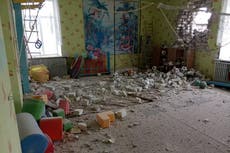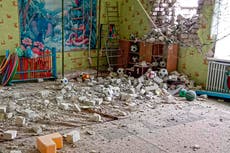Pro-Russia rebels evacuate civilians from east Ukraine as the West fears imminent invasion
US and UK warn that Moscow may use increased shelling in eastern Ukraine as a ‘pretext’ to invade
Pro-Russian rebels in eastern Ukraine have started evacuating citizens of the breakaway region to Russia, a move that Western leaders fear Moscow could use as a pretext to invade.
After two days of shelling between Ukrainian government forces and Russian-backed separatists, Denis Pushilin, head of the self-proclaimed Donetsk People’s Republic, said he believed Kiev was planning to attack the separatist state and announced the evacuation of its citizens to Russia.
The Luhansk People’s Republic, another Russian-backed separatist state, announced similar plans.
Millions of civilians are believed to live in the two rebel-held regions of eastern Ukraine; most are Russian speakers and many have already been granted Russian citizenship.
However, there are no signs that Kiev is planning an offensive in east Ukraine, where the front lines of the conflict have remained consistent for seven years. Its foreign ministry has rejected Mr Pushilin’s claims.
“Ukraine does not conduct or plan any such actions in the Donbas,” said Dmytro Kuleba, Ukraine’s foreign minister. “We are fully committed to diplomatic conflict resolution only.”
Asked about Mr Pushilin’s plan - which he announced on social media - Kremlin spokesman Dmitri Peskov told journalists that he “didn’t know what was going on there with Pushilin”, according to the Interfax news agency.
Russian President Vladimir Putin has not commented on the evacuation announcement but told a press conference in Moscow that he was witnessing an “aggravation of the situation in the Donbas”.
Mr Putin made accusations of “mass and systematic violation of human rights” and enshrining in law “discrimination of the Russian speaking population” in Ukraine.
Russian-backed separatist authorities later said on Friday that a car had been blown up near their government building in the centre of the city of Donetsk, but that no-one was hurt, according to Russian news agencies.
The eastern Ukraine conflict zone saw the worst shelling for years on Friday, with the Kiev government and the separatists trading blame. Western countries have said they think Moscow plans to use the conflict to justify an all-out invasion of its neighbour.
Moscow has denied it is planning an attack and said this week it is drawing down forces massed near Ukraine, yet Nato and the West believe it is ramping up its military presence. Washington says Russia has up to 190,000 troops near the border, up from 100,000 at the end of the January.
In one barrage in the Donbass region - which has seen conflict for eight years - the Russian-backed forces hit a nursery school in the city of Stanytsia Luhanska. The children, who were in another part of the building were unhurt, but three people were injured.
“We heard the sound of broken glass. The children were very scared. Some kids started crying immediately, and the explosions continued for the next 20 minutes," Olena Yaryna, the school’s director, told The Associated Press.
Thursday’s clashes in eastern Ukraine were the biggest since 2015 in the long-running conflict between the separatists and Kiev, a diplomatic source told Reuters. Observers from the Organisation for Security and Cooperation in Europe (OSCE) had already recorded 80 ceasefire violations along the dividing line between the two sides as of Friday morning.
Shortly after the evacuation announcement in Donetsk on Friday, a loud warning siren sounded in the city centre.
People will start being bussed out of the Donetsk region at pm (17pm GMT) on Friday, Interfax news agency cited a source saying.
Earlier on Friday, Russia announced that Mr Putin would personally supervise exercises of its strategic nuclear missile forces on Saturday, though it said these drills were no cause for alarm.
US president Joe Biden has warned that a Russian attack on Ukraine is almost inevitable and could happen “within the next several days”.
The UK government, a key Nato member, wrote on Twitter that they see “no evidence that Russian forces are withdrawing from Ukrainian border regions” and warned the invasion could take place “without further warning”.
Mr Biden, rallying allies to maintain a unified stance, will host a call on Friday with leaders of the UK, Canada, France, Germany, Italy, Poland and Romania, plus the EU and Nato.
Following the call, Mr Biden will deliver public remarks on Friday to give an update on US diplomatic efforts to prevent what it calls an increasingly likely Russian invasion of Ukraine.
In other developments, US Secretary of State Antony Blinken has agreed to meet Russian foreign minister Sergey Lavrov next week in Europe - provided that Russia does not invade Ukraine.
Germany, meanwhile, said Russia is putting Europe’s security at risk with its actions.
“With an unprecedented deployment of troops on the border with Ukraine and Cold War demands, Russia is challenging fundamental principles of the European peace order,” German foreign minister Annalena Baerbock said ahead of the annual Munich Security Conference.
While a plethora of world leaders and top officials, including US vice president Kamala Harris and Ukrainian president Volodymyr Zelensky, are travelling to the German city, Moscow has refused to participate in the conference.
Additional reporting by agencies
Join our commenting forum
Join thought-provoking conversations, follow other Independent readers and see their replies
Comments


Bookmark popover
Removed from bookmarks